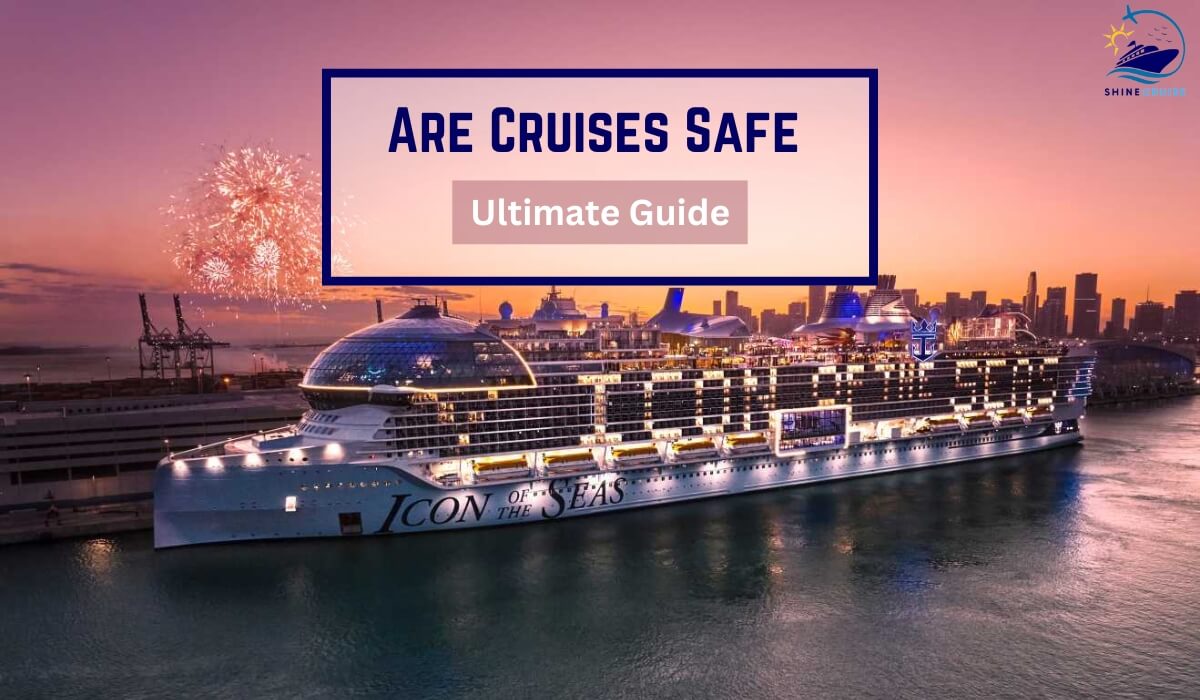Cruises are known for being luxurious vacations on the ocean, offering relaxation and adventure. But many people wonder, Are Cruises Safe? Stories of sickness outbreaks and accidents at sea have raised concerns.
As travelers consider the risks versus the attractions of visiting exotic places and enjoying all-inclusive perks, they may question whether cruise ships provide a perfect vacation or hide dangers behind their fancy appearance.
Let’s explore the safety precautions on modern and large ships and find out how safe are cruises right now.
Are Cruises Safe?
Cruise ships are generally safe, with few serious accidents despite the large number of passengers each year. International and national regulations along with safety measures on ships help to ensure safety.
Regulations include international agreements like SOLAS, MARPOL, and STCW, as well as inspections by flag states and port authorities. In the U.S., the Coast Guard inspects ships in American waters and the CDC oversees sanitation.
Safety measures on ships include compartmentalization to prevent flooding, fire-resistant materials, stability systems, and emergency equipment like lifeboats and life rafts. Crew members receive training in safety procedures and passengers are briefed on safety protocols.
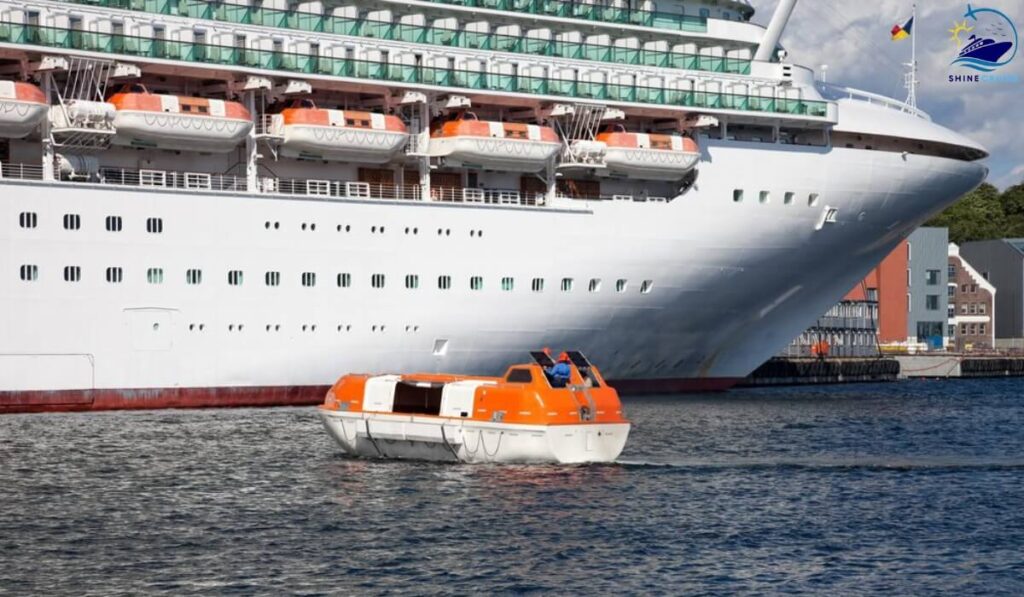
Common incidents like small fires, power outages, and health concerns are manageable. The industry is always improving safety practices through technology, crew training, waste management, and safety protocol updates.
Passengers also have a role in safety by attending briefings, following instructions, practicing good hygiene, and reporting concerns. While no travel is risk-free, cruise ships prioritize safety through regulations, technology, and well-trained crew members.
Overall, cruising remains a safe and enjoyable option for travelers due to the industry’s commitment to continuous cruise ship safety improvement.
Are Cruise Ships Safe and People Concern
Cruise ships are very safe even though they travel through tough waters. Modern cruise ships are one of the safest ways to travel despite people thinking they are dangerous. The cruise industry has a strong safety record considering how many people travel on cruises – over 31 million by the end of 2023.
Due to the ongoing growth and trust in cruising, it’s likely that in 2024, the numbers could be 32 to 35 million passengers globally.
Data from the International Maritime Organization shows that cruise ships have fewer accidents per million passengers compared to other passenger vessels. This good safety record along with the many people choosing cruises shows that modern safety measures on cruise ships work well.
Cruise Ship Safety Tips
Following are the cruise safety tips:
Familiarize Yourself with the Ship’s Layout
Take time to explore the ship and learn its layout. Find the emergency exits near your cabin and places you go often. Knowing the ship’s layout can help you move around easily and safely.
Most cruise lines give you maps in your cabin or on their apps to use them to find emergency exits on your deck, know where the lifeboats are and find the medical center and guest services desk.
Attend the Muster Drill
The Muster Drill is a crucial safety briefing conducted at the beginning of every cruise. Pay close attention during this drill even if you’ve cruised before. Familiarize yourself with your muster station location, the sound of the emergency alarm, and the proper way to put on a life jacket.
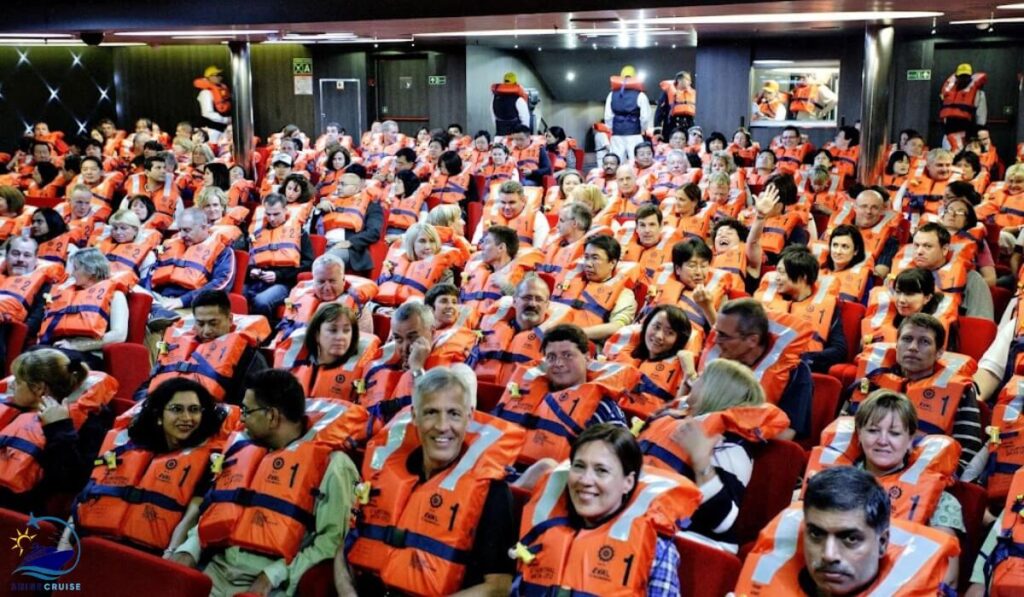
This knowledge could be invaluable in the unlikely event of an emergency.
Practice Cabin Safety
Practice cabin safety by always locking your cabin door using the peephole before opening, storing valuables in the safe, and being cautious about letting strangers in.
Secure Your Valuables
Use the in-room safe to store valuable items like passports, jewelry, and extra cash. When in port only carry what you need for the day. Consider using a money belt or hidden pouch for added security when exploring unfamiliar destinations.
Practice Good Hygiene
It’s important to keep clean on a cruise ship because many people are in close quarters. Wash your hands before eating and after using the bathroom. Use hand sanitizer stations on the ship.
These actions can help lower your chances of getting or spreading illnesses like norovirus. Tell the medical staff right away if you feel sick.
Stay Informed About Port Safety
Before disembarking at ports of call, attend any safety briefings offered by the cruise line about the destination. Research the areas you plan to visit and be aware of any travel advisories. Stick to well-traveled areas after dark and consider booking shore excursions through the cruise line for added security.
Be Mindful of Alcohol Consumption
Enjoy the festive vibe but be careful with alcohol. Drinking too much can make you do risky things and increase the chance of accidents. Stay safe by drinking water, being cautious on slippery surfaces and watching out for your surroundings.
Don’t go into restricted areas or climb on railings. Drinking too much can also make you an easy target for theft or assault. And nobody wants a hangover ruining the next day’s fun.
Exercise Caution on Balconies
If your cabin has a balcony, exercise caution. Never climb or sit on balcony railings and supervise children closely in these areas. Avoid throwing anything overboard, as this can be dangerous to marine life and is often illegal.
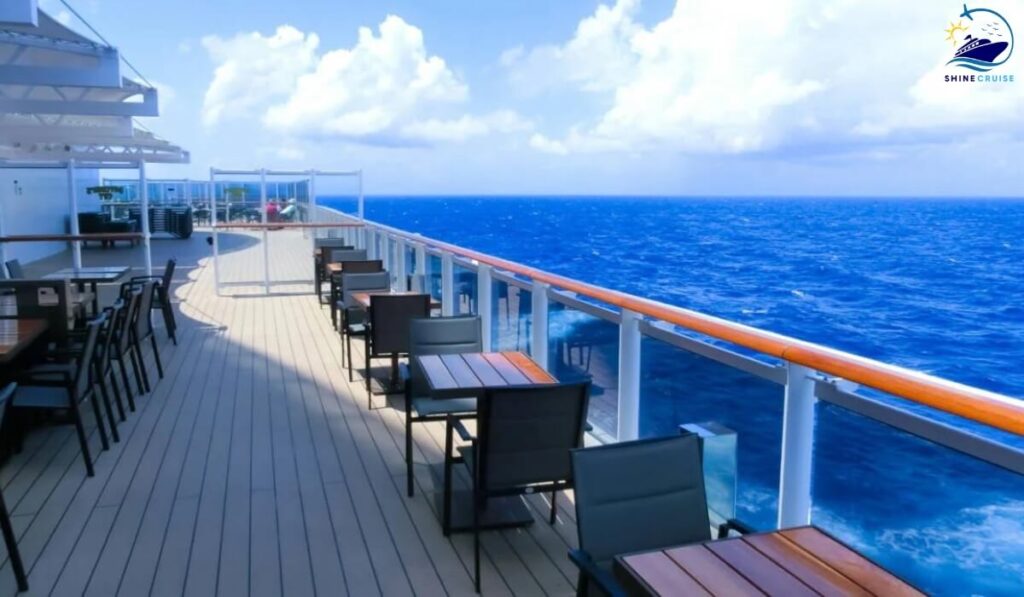
Be mindful of strong winds that can blow loose items off the balcony.
Mind the Weather
Pay attention to weather updates from the crew. Hold onto handrails in rough seas. Stay away from open decks in bad weather. Follow crew directions during weather emergencies.
Follow Deck Safety Rules
Adhere to all posted safety rules on deck areas. Don’t run on wet surfaces and use handrails on stairs during rough seas. Obey pool and hot tub rules including depth restrictions and diving prohibitions. Be very careful when using these facilities in bad weather or at night.
Report Suspicious Activity
If you notice any suspicious behavior or safety concerns, report them to ship security immediately. This could include unattended baggage, individuals acting strangely, or any situation that seems out of place. Your alertness can contribute to the overall safety of everyone on board.
Maintain Medical Preparedness
Bring an adequate supply of any prescription medications you need, plus copies of your prescriptions. Consider travel insurance that covers medical emergencies and evacuations.
If you have specific health concerns, inform the ship’s medical staff at the beginning of the cruise. Familiarize yourself with the location of the ship’s medical center in case of emergencies.
Stay Connected and Informed
Attend daily briefings about upcoming ports and activities. Read the daily newsletter for important announcements. Keep emergency contact numbers handy. Consider purchasing travel insurance for added protection.
Supervise the Kids
Keeping your children safe on a cruise is very important. Watch them closely near pools or open decks. Teach them about the ship and set clear rules.
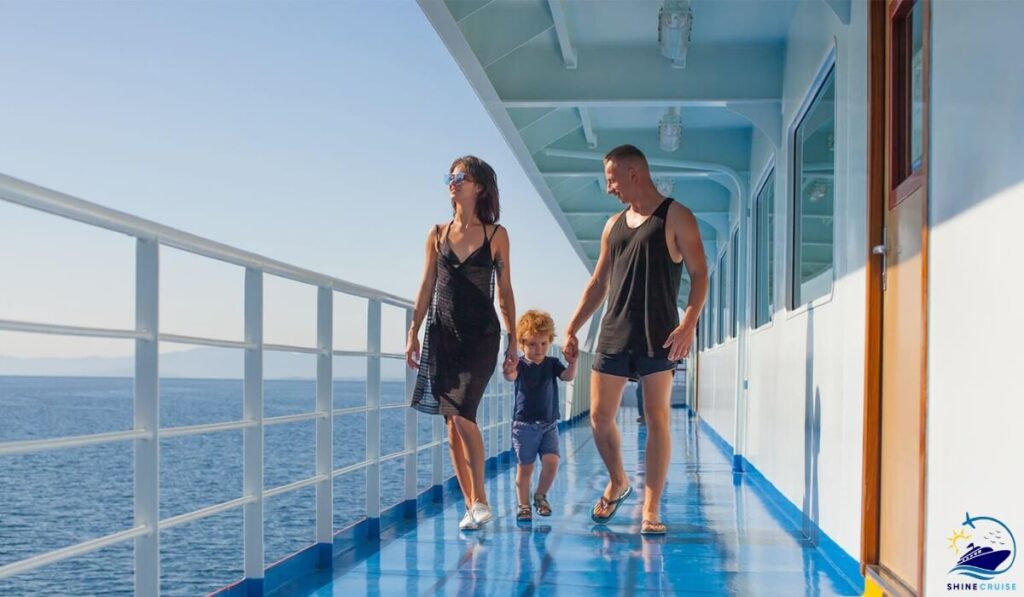
Use the ship’s youth programs for supervised activities. When not in these programs, stay with your children or make sure they are with a trusted adult. This helps keep your children safe and respects other passengers’ desire for a peaceful vacation.
Cruise Card Security
Protect your cruise card because it’s linked to your onboard account. If you lose it, tell guest services right away to deactivate and replace it. Keep your card safe in a lanyard or zippered pocket.
Don’t lend it to anyone, even friends or family. Check your account for unknown charges. Use purchase limits or a PIN if the cruise line offers them. Take a photo of your card in case you lose it.
Are There Police on Cruise Ships?
Yes, cruise ship police officers are like security guards. Cruise ships have their own dedicated security teams to ensure passenger safety and maintain order. These teams’ officers often have experience in military or law enforcement.
Their responsibilities include monitoring cameras, patrolling public areas, and handling conflicts or bad behavior among passengers.
In cases of misconduct, security personnel have the authority to take necessary actions which may include confining passengers to their cabins or in more serious cases of misconduct, security can confine passengers to the ship’s holding area commonly referred to as the brig.
For major violations of rules, individuals may be disembarked at the next port and handed over to local authorities.
Do Cruise Ships Have Enough Lifeboats for Everyone Onboard?
Modern cruise ships have enough lifeboats for all passengers and crew, thanks to lessons from the Titanic disaster. After that tragedy, the maritime community created the Safety of Life at Sea (SOLAS) standards, which now guide ship safety worldwide.
These rules require ships to have plenty of lifeboats and rafts for everyone on board with extra capacity in case some lifeboats are damaged or hard to reach.
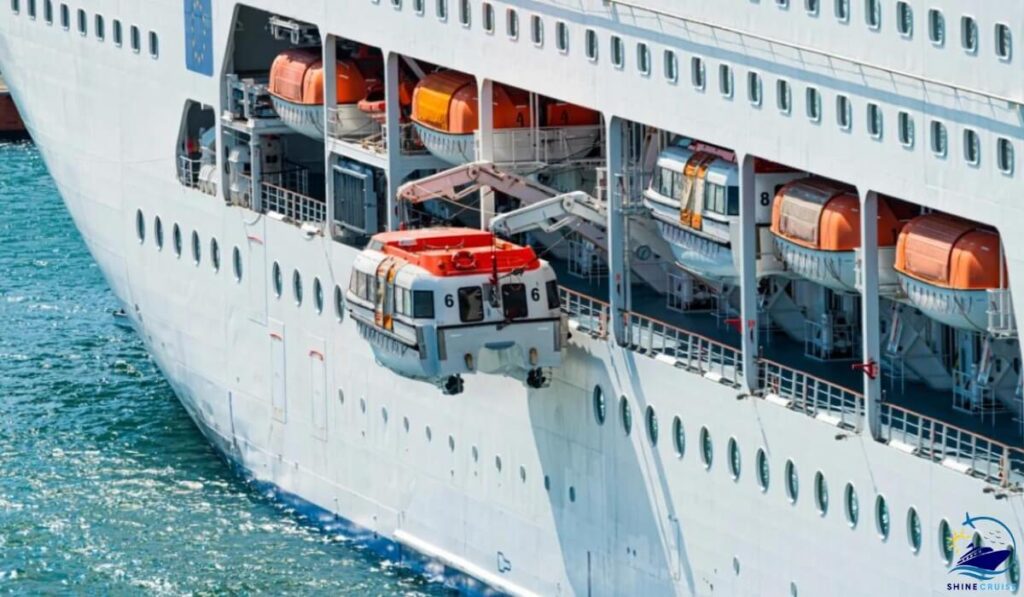
Today’s cruise ship safety boats are advanced, with navigation and communication tools, and basic survival supplies. This means that if there’s an emergency, passengers and crew can safely leave the ship and stay alive until help comes.
Are Cruises Safe from Sinking?
Modern Cruise ships are made with many safety features to prevent sinking after the Titanic and other cruise ships sinking tragedy. New Cruise ships have advanced engineering like sealed compartments in case of a breach.
Ships must follow safety rules like SOLAS, made after the Titanic sank Cruise lines use systems to watch and avoid dangerous weather. Staff get to do emergency and cruise ship safety drills.
Cruise ship sinkings are very uncommon. Most cruises finish without any big problems. While no ship is completely safe from sinking, modern cruise ships have low risk because of many safety measures and rules.
Do Cruise Ships Have Doctors Onboard?
Yes, all large cruise ships have medical staff on board including doctors and nurses. The ship medical centers can provide basic care for accidents, illnesses, and emergencies. The goal is to stabilize and comfort passengers until they can go to a nearby hospital. Many cruise lines added more medical professionals after COVID-19 started.

Doctors on cruise ships can help with seasickness, cuts, bruises, and minor issues without needing to send passengers off the ship. Medical care on cruise ships can be costly and is not covered by regular health insurance, so it’s wise to buy travel insurance. River cruise ships usually don’t have medical staff because they are close to land-based medical care.
Will I Get Sick on a Cruise Ship?
Cruise ships have good health standards but getting sick on a cruise is possible, just like anywhere else. Cruise ships have to meet high cleanliness standards set by the U.S. Centers for Disease Control and Prevention through the Vessel Sanitation Program to prevent passengers getting sick. Follow ship wellness policies to stay healthy on a cruise.
If you feel sick during the cruise, tell the ship’s medical staff right away. By doing these things and looking after your health, you can lower your chances of getting sick and have a better cruise. For seasickness, bring remedies like Dramamine, acupressure bands, or ginger candies. Stay rested, hydrated, and know your alcohol limits.
How Safe are Cruise Ships?
Modern Cruise ships are very safe with a strong safety record overall. They operate under strict international maritime regulations and are subject to regular inspections. Modern cruise ships are equipped with advanced safety features including fire suppression systems, life-saving equipment like lifeboats, and navigation technology.
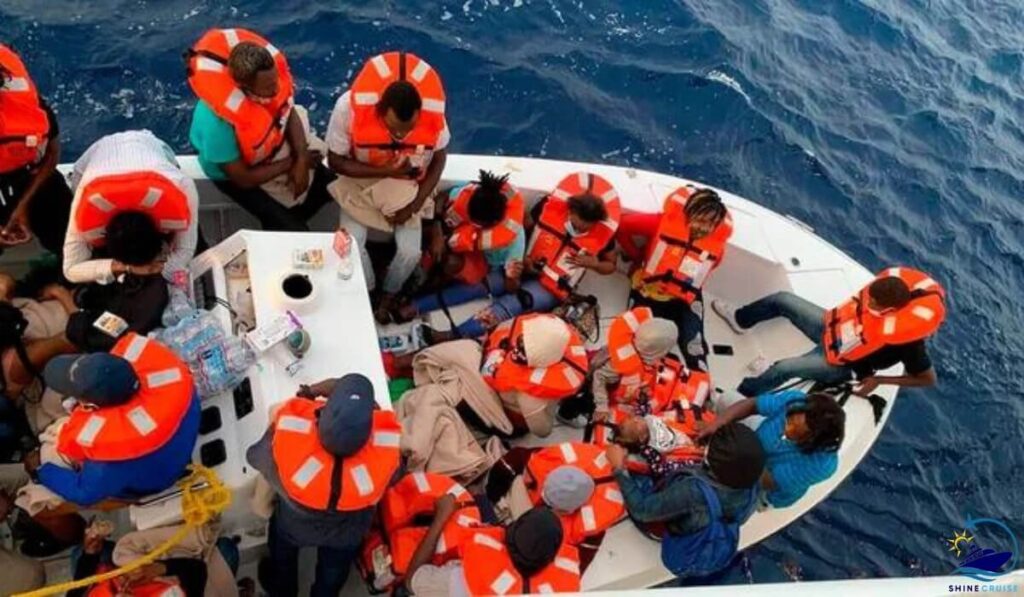
Crew members are well-trained, and ships conduct regular emergency drills. While incidents can occur, serious accidents are rare considering the millions of passengers who cruise annually.
Can You Fall off a Cruise Ship?
Falling off a cruise ship is very rare and happens because of severe misconduct. Modern Cruise ships are made with safety in mind featuring chest-high railings on balconies and outdoor decks supported with metal bars or Plexiglass panels to prevent accidental slips.
Most overboard incidents involve things like drinking too much, going into off-limits areas, or doing risky things like climbing on railings. Accidental falls from wet floors or tripping are not enough to make someone fall overboard.
To stay safe, passengers should follow the rules, and watch children closely. By doing these things and using common sense, the chance of falling overboard is almost zero for most cruise passengers.
FAQs – Are Cruises Safe
Are Cruises Safe from Pirates?
Modern cruise ships are very safe from pirates, thanks to their advanced security systems and trained security teams on board. These ships also stay away from dangerous areas and are protected by naval patrols.
Are Cruises Safe During Hurricane Season?
Cruise lines prioritize passenger safety during hurricane season by closely monitoring weather patterns and adjusting itineraries as needed. Modern Cruise Ships are equipped with advanced weather tracking systems and often avoid storms.
Are Cruises Safe for Solo Travelers?
Cruises can be quite safe for Solo Travelers. Most ships have strong security measures and well-lit public areas. Many cruise lines offer single cabins and organize activities for solo travelers to meet others.
- 10 Best Cruises for Couples in 2026 for a Romantic Getaway - February 3, 2026
- 10 Best Kids Sail Free Cruises 2026 for Budget Families - February 3, 2026
- 18 Best Cozumel Beaches Near Cruise Port for a Perfect Day! - January 31, 2026

